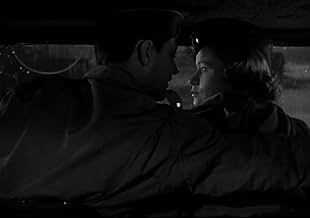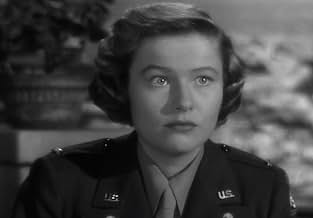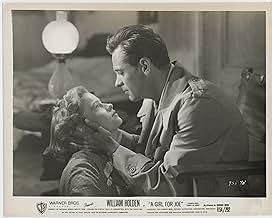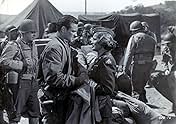अपनी भाषा में प्लॉट जोड़ेंDuring World War II in Italy, an American sergeant and WAC lieutenant take time out for romance.During World War II in Italy, an American sergeant and WAC lieutenant take time out for romance.During World War II in Italy, an American sergeant and WAC lieutenant take time out for romance.
- पुरस्कार
- कुल 1 जीत
Argentina Brunetti
- Signora Maduvalli
- (बिना क्रेडिट के)
Francesco Cantania
- Barber
- (बिना क्रेडिट के)
Frances Canto
- WAC
- (बिना क्रेडिट के)
Philip Carey
- Military Police Sgt. Fred Miller
- (बिना क्रेडिट के)
Amelia Cova
- Lea Maduvalli
- (बिना क्रेडिट के)
Ashley Cowan
- Patient
- (बिना क्रेडिट के)
Danny Davenport
- Driver
- (बिना क्रेडिट के)
Anna Demetrio
- Mamma Mia
- (बिना क्रेडिट के)
फ़ीचर्ड समीक्षाएं
It's been tough fighting in Italy. Sgt. John 'Pete' Peterson (William Holden) and his men are getting pulled out for five days after a terrible battle. He meets WAC Lt. Eleanor MacKay (Nancy Olson). Maj. Blackford (Frank Lovejoy) has a battlefield commission for him. He gets closer to Lt. MacKay and soon has to go back to the front.
This movie is divided between love and war. The love part has a melodramatic romance with some limited heat. She's a good girl on the rebound from a trauma. He's been in the thick of it. The romance is rather old fashion. The war part has some functional battles with a mix of real and staged footage. The fighting is somewhat realistic with many friendlies killed.
This movie is divided between love and war. The love part has a melodramatic romance with some limited heat. She's a good girl on the rebound from a trauma. He's been in the thick of it. The romance is rather old fashion. The war part has some functional battles with a mix of real and staged footage. The fighting is somewhat realistic with many friendlies killed.
Just caught it on Turner. The reviews calling it "routine" show how dull-normal some people are. In fact, the old pro Michael Curtiz (look him up) brings an extraordinary sensibility to the film. Gone are his romantic stylings of Casablanca and Robin Hood, his lush, overdone Warner's agreeable foolishness. Instead, he portrays war as bitter and without glory, full of random death and meaningless violence. The three combat sequences are superb, and Holden, as he would later demonstrate in "Bridge on the River K" is brilliant as a reluctant soldier who has no sense of glory and no wish to be a hero, but is nevertheless the everyman Infantryman, who knows he must do his duty. Curtiz doesn't turn this evocation of battle into boy's fantasy; it's hard, bitter, terrifying and brutally unfair to children and especially young American men who never thought they'd be dying in the slopes of Mt. Casino. The romance is nicely done, even if the ending is trite (but, in the way that cheap melody can be, amazingly satisfying). Olsen and Holden have great chem (as they proved in three other films as well) and all in all, the whole piece is kept in a register of near-realism that's very affecting. A neglected minor gem from the great Curtiz.
People keep comparing this film with "A Fairwell To Arms" (1932). If that is true, then it can also be seen as a stepping stone to "The Americanization of Emily" (1964) — highlighting how changing American attitudes toward war have become gradually more cynical.
Seems like the "Emily" team — writers and director — might have been influenced by Sgt. Joe 'Pete' Peterson (Holden character), transposing Garner's Charlie Madison to be an updated version of same. 1932 > 1951 > 1964.
All three successfully integrate Romance and War, ably supporting the theme that Love is the stronger force. So why do we keep on making war?
Seems like the "Emily" team — writers and director — might have been influenced by Sgt. Joe 'Pete' Peterson (Holden character), transposing Garner's Charlie Madison to be an updated version of same. 1932 > 1951 > 1964.
All three successfully integrate Romance and War, ably supporting the theme that Love is the stronger force. So why do we keep on making war?
I really liked this movie. I fast forwarded through the love scenes though. I am a Holden fan and I seem to like his snide comments he always seems to make. His comments are usually like "gallows humor". In times of stress everything seems to take on a different view or meaning. I also liked where Holden seems to exhibit PTSD. He talks about the horror of the battlefield and his men dying for no reason. I liked this because I thought the US Government did not want anything but us the good guys and the enemy the bad. Most war movies show us never getting hurt and the enemy all dying, What tipped me off was the word "San Pietro". John Huston made a movie called that and it was banned by the Government and not shown because it showed people actually getting killed. Lastly, all the equipment looked real and used in the real manner even down to the mail room! Usually I can find many errors in guns and ammo. Another good movie to watch is, "Pork Chop Hill" with Gregory Peck. You actually see men using body armor and guns and ammo used in the proper manner.
Forget San Pietro. The real conflict in this early 50s combat film is between anti war cynicism and patriotic effusion. The later wins out, as it almost always would in a pre 1960s Hollywood war movie, but the fact that there is even a spirited contest between the two ideologies shows just how far in the rear view mirror WW2, our only morally justified foreign engagement, had receded by 1951, especially once Korea had taken its place.
So if only as a marker of American society's changing views on war and flag waving this film would be worthy of notice. It is also the last good work of its director, the great Michael Curtiz*, who has at least two films in the top Hollywood 100 of the twentieth century (three if you're a "Yankee Doodle Dandy" fan, which I am not) featuring very realistic, hard bitten battle scenes.
Unfortunately, as previous reviewer planktonrules noted, the film is marred by some of the worst, gushy, mushy, cloyingly romantic dialogue, in the love scenes between William Holden and Nancy Olson, this side of a Fanny Hurst novel. I mean, Holden is a legitimately great actor but not even he can survive such lines as "With you I will live forever", spoken sincerely. And Olson, a much less skilled thesp, is completely done in by the lovey dovey twaddle composed by scenarist Orin Jannings, a scribe with whom I am thankfully not familiar.
Bottom line: Give it a generous B minus 'cause I'm a big Curtiz fan.
*There are some who regard 1958's "King Creole", with Elvis, as good. I am not among them.
So if only as a marker of American society's changing views on war and flag waving this film would be worthy of notice. It is also the last good work of its director, the great Michael Curtiz*, who has at least two films in the top Hollywood 100 of the twentieth century (three if you're a "Yankee Doodle Dandy" fan, which I am not) featuring very realistic, hard bitten battle scenes.
Unfortunately, as previous reviewer planktonrules noted, the film is marred by some of the worst, gushy, mushy, cloyingly romantic dialogue, in the love scenes between William Holden and Nancy Olson, this side of a Fanny Hurst novel. I mean, Holden is a legitimately great actor but not even he can survive such lines as "With you I will live forever", spoken sincerely. And Olson, a much less skilled thesp, is completely done in by the lovey dovey twaddle composed by scenarist Orin Jannings, a scribe with whom I am thankfully not familiar.
Bottom line: Give it a generous B minus 'cause I'm a big Curtiz fan.
*There are some who regard 1958's "King Creole", with Elvis, as good. I am not among them.
क्या आपको पता है
- ट्रिवियाOne of 4 films that William Holden and Nancy Olson appeared in together, the others being Sunset Boulevard (1950), Union Station (1950), and Submarine Command (1951).
- गूफ़In this story set in the 1943 WWII Italian Campaign, Lieutenant MacKay and the other female characters all wear their hair shorter and their skirts longer, in the trending fashions of the early 1950s.
- भाव
Sgt. Joe Peterson: You mean you were a civilian once?
Lt. Eleanor MacKay: Oh, if you consider schoolteachers civilians.
Sgt. Joe Peterson: You, honest?
Lt. Eleanor MacKay: Mm-hmm.
Sgt. Joe Peterson: Well, and me without an apple!
- कनेक्शनFeatures San Pietro (1945)
टॉप पसंद
रेटिंग देने के लिए साइन-इन करें और वैयक्तिकृत सुझावों के लिए वॉचलिस्ट करें
विवरण
- चलने की अवधि1 घंटा 39 मिनट
- रंग
- पक्ष अनुपात
- 1.37 : 1
इस पेज में योगदान दें
किसी बदलाव का सुझाव दें या अनुपलब्ध कॉन्टेंट जोड़ें
































